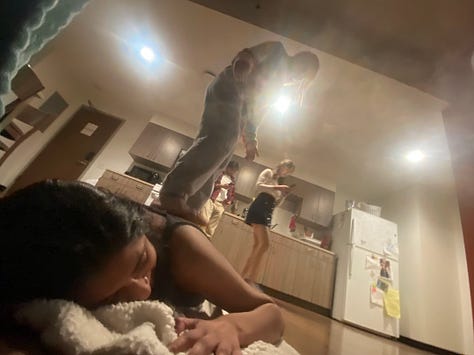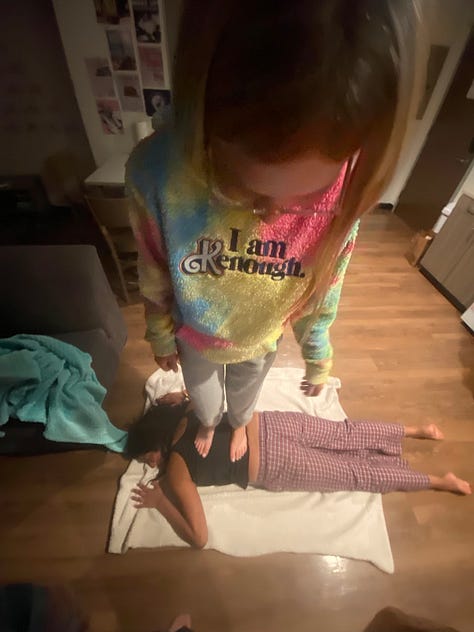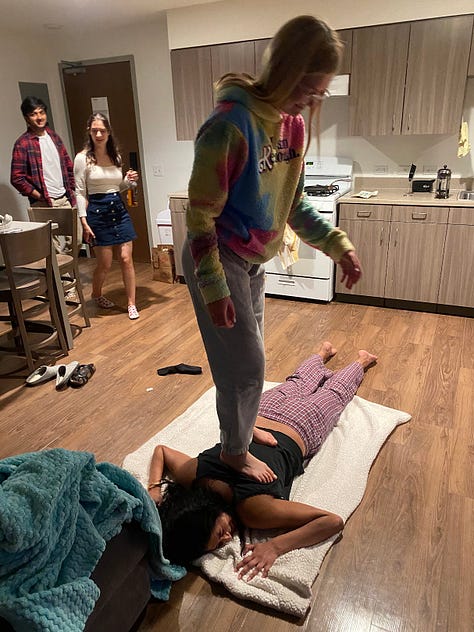Lately I’ve been feeling incredibly grateful for reading, which is why I wanted to write about it. This essay is about why I started reading again. Next week I'll get into the mechanics of how and what I read. Hope you enjoy!
My entire life, I have been working long and hard to justify the utility of reading fiction. As I have grown older and wiser at my grand old age of twenty-one, I look back and realize that I owe most of what I am to reading, particularly reading fiction. It feels incredibly nerdy to admit this—at some point in my life I probably would have stuffed myself in a locker for spewing a platitude as cheesy as “books saved me.” But alas, here I am.
Against “Storybooks”
I never liked doing much as a kid other than reading. Like most children, I had little autonomy and hated it—no money, no job, no say in where I lived or what I ate for dinner. The only things I could choose were the books I read.
Much to my parents’ dismay, I’d come from school every Friday with a stack of books from the elementary school library, so heavy in my backpack that I’d walk with a perpetual slouch. At school, I was praised for being such a voracious reader, but this voracity deeply worried my parents. Not because I read anything inappropriate (and even if I had, they wouldn’t have known as they were not native English speakers). Their concern was that I only read fiction—or as they called them, “storybooks.”
How was I ever going to make something useful of myself if I spent all my time engrossed in make-believe fantasy worlds? If only I could read books about animals and circuits like my brother did and inherit some of his intellectual curiosity and sensibility. It was clear that my brother’s STEM-oriented reading habits would lead him towards something noble and productive (he became a doctor). But what were my poor parents to do with a child who spent most her time engrossed in the make-believe?
My parents were no strangers to sacrificing all of life’s whimsical pursuits to immigrate to America and give my brother and me every practical thing we could ever need. But as they understood, reading fiction was yet another mindless American proclivity—like sports, drinking, and pop music.
And I was proof. In fifth grade I was reading the last book of the Twilight series, my mom had left for the day and left me with one simple task: to defrost the chicken. Enthralled by my world of vampires and werewolves, the whole day had passed, and I had not moved all day. I was sitting in my room with the lights off when I heard the garage door open and all hell broke loose.
I went on to face the consequences: my parents decided my reading was a problem and banned me from fiction for the foreseeable future.
Of course, their grounding didn’t work. I still read what I wanted, but now with extra guilt. Not only did reading make me a useless good-for-nothing, but now it also made me a borderline delinquent!
Towards Utility
Soon enough, I started to realize what my parents had known all this time. I was twelve years old and barely passed geometry, squarely facing the reality that if I didn't get smarter or richer now, I was doomed for a lifetime of being stuck in my middling town. A good-for-nothing reading Twilight in my pink princess room at thirty.
And while I loved my fiction—The Book Thief was my favorite that year—those books weren’t making me smarter or richer, at least not in the ways that mattered. So for the first time, I broke my heart with the kind of cruelty you can only do unto yourself.
I picked up business books from the boring back shelves of the public library and started enterprising. Searching long and hard between the lines to find a way to forge myself into a formidable, useful young woman.
Fiction fell to the wayside. I only read it for required reading in English class, which I loved because now I could justify fiction as a means of “getting my grades up.” But by that point, the only person I had to convince was myself, as I was hurtling a mile a minute towards my naive definition of success.
Somewhere in between, I got a job at the public library. Making $9 an hour erasing penises off Big Nate books and being an otherwise tax-paying, productive individual. Instead of indulging in all the thousands of wonderful fiction books available to me during my eight-hour shifts, I got it in my head that to be the best I could possibly be, I had to read philosophy because the answers to all of my life’s problems were surely somewhere inside Ecce Homo. (They certainly were not!)
When it came time to choose a career, I decided I ought to be an engineer. While I loved every subject in school— primarily and History and English because of the stories—I decided, on my own this time, that I needed to be somebody useful. Once I was a wildly successful career woman engineer, I could buy and read all the books I wanted on my weekends off.
Suboptimal Fiction
I love studying machines. What’s fundamental about all machines is that they are defined by inputs (what you put in) and outputs (the result). The kind of engineering I study, and the classes I enjoy most, revolve around optimization. How do we maximize outputs while minimizing inputs? How do we make things work better?
Since middle school, when I first became obsessed with my own utility, I’d become accustomed to treating myself like a machine, and now I had a sophisticated framework to do so. I used to have this head-in-the-clouds whimsy about reading, Words on a page could leave me breathless and reduce me to tears. No more. I decided fiction was no longer an optimal pursuit: the input (hours spent trudging through pages) wasn’t worth the output (finding out what happens at the end). What was optimal: going to the gym while listening to trite self-help audiobooks between bicep curls, so I could dedicate the rest of my hours to getting a job and passing physics.
While I was a hyper-optimized machine, I felt no enjoyment in anything I was doing. My life was colorless and devoid of wonder. All of my hard work and efficiency felt fruitless and everything I wanted felt like a fantasy where the bad guy always lost and everything ended happily ever after.
Against Utility
The second semester of my sophomore year, the machine finally broke. I lost the ability to sleep. I was incredibly useless that entire semester. Sleepless nearly every school night, then spending weekends—the only time I was allowed unaltered fun —sleeping until 5pm. By that point, I had read nearly every piece of canonical self-help content. More or less they all gave the same well-meaning advice: a couple anecdotes peppered throughout, but mostly statistically backed conclusions. If I was so smart and full of facts and logic, why was I fundamentally incapable of helping myself?
I averaged about four hours asleep a night, so I thankfully don’t remember much from back then other than the comfort of old stories with familiar endings. Once my roommates went to sleep, there was no one left to entertain me.



Because I had nothing else to do, I started seriously reading and writing again. I soon realized—fiction had been propelling me forward my entire life. I never liked doing much as a kid other than reading, yet despite my apathy, I’d convinced myself to do so much else.
The more fiction I read, the less jaded I became. Without stories, I'd grown to dislike engineering because I was fundamentally disconnected—apathetic to my insular bubble of petty problems and optimization equations. Between differential equations and data structures, it’s easy to forget what all that work its all for.
I grew up reading all kinds of fiction about all sorts of people and places. From children in the Middle East to the hollers of rural Appalachia. Through their eyes, I learned to care about all of it like it was my own backyard, like those characters were my own friends. It was that connection to a world I didn’t quite know that made me deeply driven to do something for it.
Towards “Storybooks”
It took me more time than I care to admit to figure out that I was, in fact, not a machine but a real human girl! If I was a machine, I would have been able to follow every step and do what was scientifically proven to be good for me. But I couldn’t. I knew all of the right answers—the only way I could believe any of them was through stories.
Nowadays, we have the world at our feet. In half a second I can learn everything fact there is to know about the world. Statistics about poverty, data about climate change, facts about faraway wars. But these all remain abstractions, numbers on a screen, until a story makes you feel it your skin and deeply care enough to do something.
I spent so much of my life desperately trying to be useful. Avoiding impractical fantasy worlds, neglecting myself for needing them. In hindsight, no business book, no self-help audiobook, and certainly not Nietzsche ever did for me what my “storybooks” did.
Thank you for reading! Tune in next week for an essay about how I started reading again. You can support my writing by engaging with my work, sharing your thoughts, and reaching out. Find me on X .
I wrote a similar essay a while back while I was still figuring out how I felt about reading. Read it here.





this is so tru … fiction often teaches u just as much as nonfiction, if not more